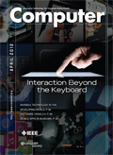
COMPUTER
Scope & Guideline
Advancing the Frontiers of Computer Science.
Introduction
Aims and Scopes
- Artificial Intelligence and Machine Learning:
The journal focuses extensively on the development, application, and implications of AI and ML technologies, including their ethical considerations, governance, and real-world applications across various domains. - Cybersecurity and Privacy:
Research on cybersecurity threats, defense mechanisms, and privacy-preserving technologies is a core area of the journal, addressing the growing concerns surrounding data security in a digital world. - Human-Computer Interaction (HCI):
HCI is a significant theme, emphasizing user-centered design, usability challenges, and the impact of technology on user experience across different applications. - Emerging Technologies:
The journal explores cutting-edge technologies such as blockchain, quantum computing, and the Internet of Things (IoT), highlighting their potential impacts on society and industry. - Computing Education and Workforce Development:
An important aim of the journal is to discuss educational practices, curricula development, and the future workforce needs in the computing field, emphasizing diversity and inclusion. - Sustainability and Ethical Computing:
The journal promotes discussions on sustainability in computing practices, the environmental impacts of technology, and ethical considerations in the development and deployment of computing systems.
Trending and Emerging
- Generative Artificial Intelligence:
There is a significant rise in research related to generative AI, exploring its applications, ethical implications, and transformative potential across various industries. - AI Ethics and Governance:
Emerging discussions around the ethical implications of AI technologies and frameworks for governance are becoming increasingly prevalent, reflecting societal concerns about the impact of AI. - Cyber-Physical Systems:
Research on cyber-physical systems is gaining momentum, focusing on the integration of computing with physical processes, particularly in areas like smart cities and autonomous systems. - Data Privacy and Security:
With increasing data breaches and privacy concerns, papers discussing innovative approaches to data privacy, security frameworks, and compliance measures are trending. - Sustainable Computing Practices:
An emerging focus on sustainability in computing practices is evident, with researchers exploring ways to reduce the environmental impact of technology and promote green computing initiatives. - Interdisciplinary Approaches to Computing:
The journal is seeing a rise in interdisciplinary research that combines computing with fields such as healthcare, education, and social sciences, highlighting the broad applications of computing technologies.
Declining or Waning
- Traditional Software Engineering Practices:
The journal has seen a decrease in papers focused solely on traditional software engineering methodologies, as newer approaches and integration with AI and agile practices gain prominence. - Hardware-Centric Discussions:
There is a noticeable decline in discussions centered exclusively on hardware technologies, as the focus shifts towards software-driven solutions and integrated systems. - Telecommunication Technologies:
Papers specifically addressing telecommunication technologies and their standalone applications have become less frequent, possibly due to the emergence of more integrated approaches involving IoT and AI. - Legacy Systems and Maintenance:
Research centered on legacy systems and their maintenance challenges is receiving less attention, as the industry moves towards modern architectures and cloud-based solutions. - General Computing History:
While historical reflections are still included, the frequency of papers solely focused on the history of computing has diminished, as contemporary and future-oriented research takes precedence.
Similar Journals

CCF Transactions on Pervasive Computing and Interaction
Driving Research at the Intersection of AI and ComputingCCF Transactions on Pervasive Computing and Interaction, published by SPRINGERNATURE, is a leading academic journal dedicated to advancing the field of pervasive computing and interaction. With an ISSN of 2524-521X and E-ISSN 2524-5228, this journal is well-regarded for its rigorous peer-reviewed research, featuring influential studies that explore the intersection of Artificial Intelligence, Computer Networks and Communications, Computer Science Applications, and Human-Computer Interaction. Recognized in the 2023 journal rankings, it holds a prestigious Q2 quartile classification across these domains, reflecting its impact and relevance in the academic community. Researchers and practitioners can greatly benefit from its contributions, showcasing innovative approaches and technologies that shape the future of interactive computing. Although currently not following an open-access model, the journal underscores its commitment to high-quality research dissemination, making it a vital resource for those interested in the evolving landscape of pervasive technologies and user-centric designs. For more information on submissions and access options, please refer to the official website.

NEW GENERATION COMPUTING
Empowering Innovation in Computer ScienceNEW GENERATION COMPUTING is a prominent academic journal published by SPRINGER, specializing in the dynamic fields of Computer Networks, Hardware and Architecture, Software Engineering, and Theoretical Computer Science. With a commitment to disseminating high-quality research since its inception in 1983 and extending its coverage to 2024, this journal occupies a vital role in advancing knowledge and innovation within these critical domains. Holding prestigious Q2 rankings in Computer Networks and Communications, Hardware and Architecture, and Software, as well as a Q3 ranking in Theoretical Computer Science for 2023, NEW GENERATION COMPUTING attracts significant contributions from scholars and professionals around the globe. Researchers will find its rigorous peer-review process ensures the publication of impactful studies, while students gain access to cutting-edge research that shapes contemporary computing practices. Though it does not offer open access, the journal remains an invaluable resource in the academic community, fostering collaboration and dialogue among experts aiming to push the boundaries of technology.
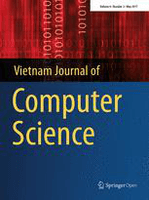
Vietnam Journal of Computer Science
Empowering researchers to shape the future of technology.Vietnam Journal of Computer Science, published by World Scientific Publishing Co Pte Ltd, serves as a prominent platform for researchers and professionals in the rapidly evolving field of computer science. Launched as an Open Access journal in 2013, it aims to disseminate high-quality research across various subfields, including Artificial Intelligence, Computational Theory and Mathematics, Computer Vision, and Information Systems. With its ISSN 2196-8888 and E-ISSN 2196-8896, the journal provides valuable insights and contributes to the growing body of knowledge in computer science, particularly in Southeast Asia. Despite its relatively recent establishment, the journal has achieved significant rankings, including Q3 status in multiple categories and notable visibility in Scopus metrics, evidencing its commitment to fostering innovative research. This journal is essential for those looking to stay at the forefront of computational advancements and applications, particularly in Vietnam and beyond, facilitating an engaging dialogue among scholars and industry professionals.

PeerJ Computer Science
Connecting Researchers with Groundbreaking DiscoveriesPeerJ Computer Science is a leading open access journal published by PEERJ INC, dedicated to the field of computer science. Since its inception in 2015, it has made significant strides in promoting scholarly communication and accessibility to cutting-edge research. With an impressive impact factor reflected by a Q1 ranking in the Computer Science (miscellaneous) category and a Scopus rank of 51 out of 232, this journal stands at the forefront of its field. The journal's open access model ensures that groundbreaking findings are readily available to researchers, professionals, and students alike, fostering collaboration and innovation in the ever-evolving landscape of computer science. As it continues to publish until 2024 and beyond, PeerJ Computer Science remains an essential resource for those seeking to stay ahead in their research and practice.
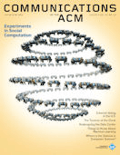
COMMUNICATIONS OF THE ACM
Championing Cutting-Edge Research and DiscourseCOMMUNICATIONS OF THE ACM, an esteemed journal published by the Association for Computing Machinery, has been at the forefront of the field of computer science since its inception in 1958. With an impressive impact factor and recognized as a top-tier Q1 journal in its category, it is currently ranked 10th out of 232 journals in the general computer science category according to Scopus rankings. This journal provides a vital platform for researchers, professionals, and students to disseminate innovative ideas and advancements across various domains of computing. Although it does not offer open access, the journal remains accessible through institutional subscriptions, furthering its reach and influence within the academic community. As researchers continue to explore the rapid evolution of technology, COMMUNICATIONS OF THE ACM serves as an essential resource for high-quality research, fostering knowledge advancements and collaborative discourse within the ever-expanding world of computer science.
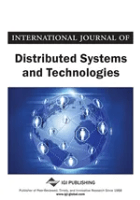
International Journal of Distributed Systems and Technologies
Exploring the Frontiers of Distributed Technologies.Welcome to the International Journal of Distributed Systems and Technologies, a prominent academic platform published by IGI Global dedicated to advancing the field of distributed systems and technologies. With an ISSN of 1947-3532 and an E-ISSN of 1947-3540, this journal, established in 2010 and continuing through 2024, offers a unique venue for researchers, professionals, and students to disseminate their findings in the realms of computer networks, communications, hardware, and architecture. Despite its current placement in the Q4 quartile for both computer networks and communications and hardware and architecture categories in 2023, the journal is committed to fostering innovative solutions and interdisciplinary collaboration that can drive future advancements. Although not open access, contributions to this journal not only receive rigorous peer review but also have the potential to significantly impact the community, underscored by a focus on applicable research that addresses the emerging challenges in technology. As part of a rich repository, the journal invites you to explore its latest issues and join in shaping the future of distributed systems.

Computer Science and Information Systems
Advancing Frontiers in Computer Science and Information SystemsComputer Science and Information Systems, an esteemed journal published by the COMSIS CONSORTIUM, serves as a vital platform for researchers and practitioners within the field of computer science and information systems. With an ISSN of 1820-0214, this open access journal has been disseminating high-quality research since 2004, making scholarly content readily accessible to a global audience. Based in Novi Sad, Serbia, the journal has established itself as a point of reference in the academic community, achieving a Q3 ranking in the Computer Science (miscellaneous) category as of 2023. With its coverage spanning from 2008 to 2024, it caters to a diverse range of topics, including software engineering, data processing, and system architecture. Although the HIndex is currently not available, the journal holds a respectable 43rd percentile ranking in the Scopus database for general computer science, showcasing its relevance in the field. By offering an open access model, it ensures that groundbreaking research can be freely accessed and utilized, fostering innovation and collaboration across disciplines.

Computers
Exploring Networks and Communications for TomorrowComputers is a leading journal published by MDPI, dedicated to advancing research in the fields of computer networks and communications, as well as human-computer interaction. Since its inception in 2012, it has established itself as a vital resource for scholars and practitioners, achieving an impressive Q2 ranking in Computer Networks and Communications and a Q3 ranking in Human-Computer Interaction as of 2023. The journal is indexed in Scopus, highlighting its relevance with a rank of #135/395 and #72/145 in their respective categories. Published in Switzerland, this open-access journal ensures widespread dissemination of research findings, supporting the global academic community in enhancing technologies relevant to computer science. Access options are available, fostering an environment where knowledge is shared freely. With an emphasis on innovation, redesign, and collaboration between humans and technology, Computers plays a crucial role in shaping the future of digital interactions.

Journal of Grid Computing
Empowering Innovation in Grid TechnologiesThe Journal of Grid Computing, published by Springer, stands as a pivotal resource in the dynamic field of computer science, particularly within the realms of Computer Networks and Communications, Hardware and Architecture, Information Systems, and Software. With an impressive Q1 ranking across these categories in 2023, the journal exemplifies excellence and rigor, catering to a diverse readership from researchers to industry professionals. Established in 2003, this esteemed journal is anchored in the Netherlands and releases cutting-edge research that reflects trends and advancements in grid computing technologies. Researchers can gain insights through its vast contributions, while institutions benefit from its prestigious standing within the SCOPUS framework, boasting high percentile ranks in multiple computer science categories. Though not open access, the journal provides unparalleled access options for institutional subscribers, solidifying its importance as a gateway to innovative discoveries in high-performance distributed computing.
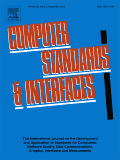
COMPUTER STANDARDS & INTERFACES
Fostering Knowledge and Best Practices in Technology Standards.COMPUTER STANDARDS & INTERFACES is a prestigious journal published by Elsevier, dedicated to the intersection of technology, law, and standards in computing. With an impressive impact factor and categorized in the Q1 quartile across several relevant fields, including Computer Science Applications, Hardware and Architecture, and Software, this journal has established itself as a critical resource for researchers and professionals alike. Covering a comprehensive range of topics over its converged years from 1986 to 2025, it provides rigorous peer-reviewed articles and vital insights into the evolving landscape of computer standards. The journal's Scopus rankings affirm its significance with top percentiles in multiple categories, including a remarkable 12th rank in Social Sciences and Law. COMPUTER STANDARDS & INTERFACES welcomes contributions that push the boundaries of knowledge and foster discussions on best practices and innovations, making it an invaluable platform for students and seasoned researchers passionate about advancing the field.